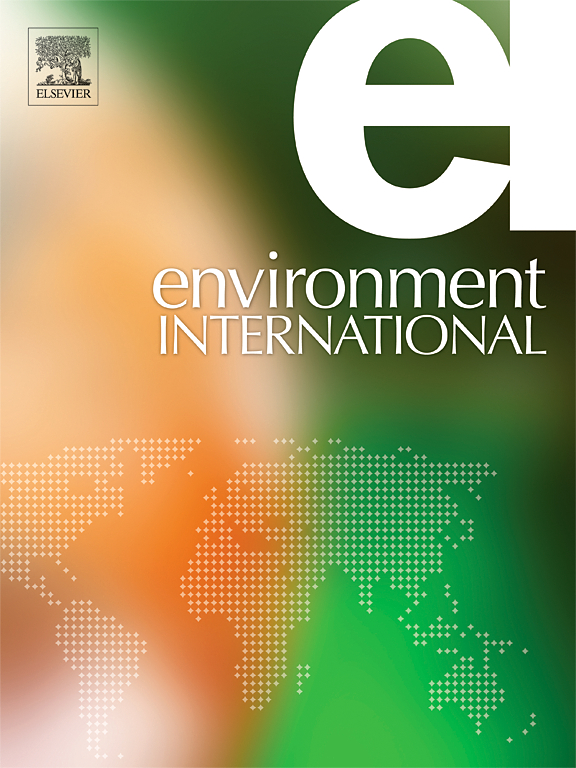急性热暴露对心血管影响的机制见解:基于随机交叉试验的多组学分析
IF 10.3
1区 环境科学与生态学
Q1 ENVIRONMENTAL SCIENCES
引用次数: 0
摘要
热暴露已被确定为心血管疾病发展的一个重要因素,但其生物学机制尚未完全阐明。我们在中国上海的健康成年人中进行了一项随机交叉试验。每名受试者在室温(22℃)和高温(32℃)下随机暴露2 h。在每次暴露前后测量血压(BP)和动脉硬度。分析了全基因组DNA甲基化、非靶向血清蛋白质组学、代谢组学和15个靶向血清生物标志物。采用线性混合效应模型对数据进行分析。途径富集在匠心途径分析平台上进行。进一步进行了基于网络的xMWAS分析。共有30名参与者(男15名,女15名)完成了试验,平均年龄为21.7 ± 1.5岁。热暴露与更高的脉搏波速度(4.4 %,95 % CI: 0.2, 6.8),增强指数归一化为75 bpm心率(190.7 %,95 % CI: 19.0, 362.3)和反射幅度(35.9 %,95 % CI: 12.3, 59.5)相关。暴露于高温与2种生物标志物的变化显著相关,其中2种与全身炎症有关,2种与氧化应激有关,1种与凝血有关,2种与脂质代谢有关,2种与动脉粥样硬化改变有关。多组学分析表明,热诱导的通路扰动主要与全身炎症、氧化应激、凝血和脂质代谢紊乱有关。急性热暴露可能损害心血管功能,促进多种不良生物过程,特别是与动脉粥样硬化进展和斑块不稳定性增加有关的生物过程。本文章由计算机程序翻译,如有差异,请以英文原文为准。
Mechanistic insights into the cardiovascular effects of acute heat exposure: A multi-omics analysis based on a randomized crossover trial
Heat exposure has been identified as a significant contributory factor in the development of cardiovascular diseases, but the biological mechanisms are not yet fully elucidated. We conducted a randomized crossover trial in healthy adults in Shanghai, China. Each subject was alternatively exposed to moderate temperature (22 °C) and elevated temperature (32 °C) in a chamber for 2 h in random order. Blood pressure (BP) and arterial stiffness were measured before and after each exposure session. Genome-wide DNA methylation, untargeted serum proteomics, metabolomics, and 15 targeted serum biomarkers were analyzed. Linear mixed-effects models were used to analyze the data. The pathway enrichment was performed at the ingenuity pathway analysis platform. The network-based xMWAS analysis was further conducted. A total of 30 participants (15 males and 15 females) completed the trial, with an average age of 21.7 ± 1.5 years. Heat exposure was associated with higher pulse wave velocity (4.4 %, 95 % CI: 0.2, 6.8), augmentation index normalized to 75 bpm heart rate (190.7 %, 95 % CI: 19.0, 362.3) and reflection magnitude (35.9 %, 95 % CI: 12.3, 59.5). Exposure to heat was significantly associated with changes in 2 biomarkers on systemic inflammation, 2 on oxidative stress, 1 on coagulation, 2 on lipid metabolism, and 2 on atherosclerotic alterations. Multi-omics analyses indicated heat-induced perturbations in pathways were mostly related to systemic inflammation, oxidative stress, coagulation, and lipid metabolism disorder. Acute heat exposure might impair cardiovascular function and promote multiple adverse biological processes, especially those related to atherosclerosis progression and increase of plaque instability.
求助全文
通过发布文献求助,成功后即可免费获取论文全文。
去求助
来源期刊

Environment International
环境科学-环境科学
CiteScore
21.90
自引率
3.40%
发文量
734
审稿时长
2.8 months
期刊介绍:
Environmental Health publishes manuscripts focusing on critical aspects of environmental and occupational medicine, including studies in toxicology and epidemiology, to illuminate the human health implications of exposure to environmental hazards. The journal adopts an open-access model and practices open peer review.
It caters to scientists and practitioners across all environmental science domains, directly or indirectly impacting human health and well-being. With a commitment to enhancing the prevention of environmentally-related health risks, Environmental Health serves as a public health journal for the community and scientists engaged in matters of public health significance concerning the environment.
 求助内容:
求助内容: 应助结果提醒方式:
应助结果提醒方式:


